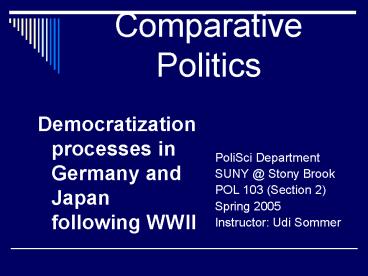Comparative Politics - PowerPoint PPT Presentation
1 / 24
Title:
Comparative Politics
Description:
Comparative Politics. Democratization processes in Germany and Japan following WWII ... Ascendancy to international scene. Conflicting imperial ambitions ... – PowerPoint PPT presentation
Number of Views:34
Avg rating:3.0/5.0
Title: Comparative Politics
1
Comparative Politics
- Democratization processes in Germany and Japan
following WWII
- PoliSci Department
- SUNY _at_ Stony Brook
- POL 103 (Section 2)
- Spring 2005
- Instructor Udi Sommer
2
General outline
- Democracy enforced from without
- Origins in American occupation
- Democratic experience prior to WWII
- Aggressors during WWII
- Reformed by USA
- Relations to current democratization processes
worldwide
3
Japan before WWII
- Isolation from Europe
- Middle Ages
- 16th century
- Togukawa Shogunite
- Edo Period
4
Characteristics
- Agricultural
- Feudal
- Hierarchical
- Samurais
- Attitudes towards foreigners
5
Opening to the West
- U.S. Navy (1853)
- Again in 1858
- Treaty of Peace and Amity
- Diplomatic relations with the West including USA
- Leading to the Meiji Constitution
6
The Meiji constitution
- 1881 announcement
- A drafting committee
- Traveling all over the globe
- Abolition of feudalism
- Adopting western institutions (e.g. German
institutions) - Western legal system
7
The Meiji Constitution
- Quasi parliamentary constitutional government
- Modern education
- Modern economic system
- Military and industry
- A Controlled Revolution
- From isolation to a world power
8
The Meiji constitution
- Assembly
- Emperor (HS, Sovereign)
- Structure of diet
- Elections restricted suffrage
- Elected PM appoints cabinet
- PM can be removed by parliament
9
Characteristics of the constitution and
importation of foreign institutional technology
- Prussian military
- British navy
- Consequences in the form of miscommunication
during WWII - Special service ministers (like the German
design)
10
The Russo-Japanese War
- Ascendancy to international scene
- Conflicting imperial ambitions
- Small but strong and recently organized army
- Russians have little forces stationed in Asia
- US mediation
- No territorial gains
- Erosion of sentiments towards USA
11
WWI and WWII
- Expand influence in Asia
- Expand territories
- Prosperity
- Japan as the superpower of the orient
- Movement towards democracy
- Breakdown of traditions
- Suffrage extended
- Freedom of press
12
WWI and WWII
- Parties are formed
- Judiciary
- Democratic procedures
- Parliament increases power
- Modernization
13
Alienation of the army
- Economic pressure
- Political pressure
- Parliamentary government not well established yet
- Influential military leadership
- Ambiguity in constitution
- Army alienated
- Expansionist army becomes influential
14
Germany before WWII
- Principalities
- Religion
- Involvement of state
- Bismarck
- Military successes
15
1871 Constitution
- Some democratic features
- Male suffrage
- Dominance of executive
- Kaiser
- Chancellor
16
Weimar Constitution
- 1871 constitution amended
- Parliamentary democracy
- Chancellor
- Role of army
- Proportional representation
- Origins of the name Weimar
17
Weimar Constitution
- The Presidency
- The parliament
- Universal suffrage
- Individual rights
- Depression
- Unemployment
- 1930s
18
The rise of Nazism
- 1933
- Reichstag fire
- Hitler ascends to power
- Fuhrer (HSHG)
19
Common features
- Democracy during 1920s
- Political instability
- Institutional arrangement
- Economic depression
- Alienation
- Dictatorships (1930s)
- No party system
- Militaristic, fascist regime
- Total destruction as a result of WWII
20
1945 1950 the occupation
- Initial attitudes
- Fear of the Soviet Union
- American occupation
- Economic reconstruction
- 4 Ds (denazification, decentralization,
demilitarization, democratization) - Impact of the Cold War
21
Writing a new ConstitutionGermany
- Leaders from the Weimar Republic
- Experience with Democracy
- Schumacher
- Adenauer
- Double ballot
- Threshold
- Powerful premiership
- Stability constructive vote of no confidence
22
Writing a new ConstitutionJapan
- Authors
- Incorporation of Meiji
- Elements of the Constitution
- Equal rights for women
- Land reform
- Unionization rights
23
General discussion Democratization from without
- Religion
- Culture
- Mutual enemy
- Social cleavages
- Democratic tradition
- Leaders
- Pro/Anti-Americanism
24
Why do some constitutions last more than others?
- Internal divisions
- Association with economic success
- Marshall Plan





![[DOWNLOAD]⚡️PDF✔️ Comparative Politics: Classic and Contemporary Readings PowerPoint PPT Presentation](https://s3.amazonaws.com/images.powershow.com/10039153.th0.jpg?_=20240525038)

























